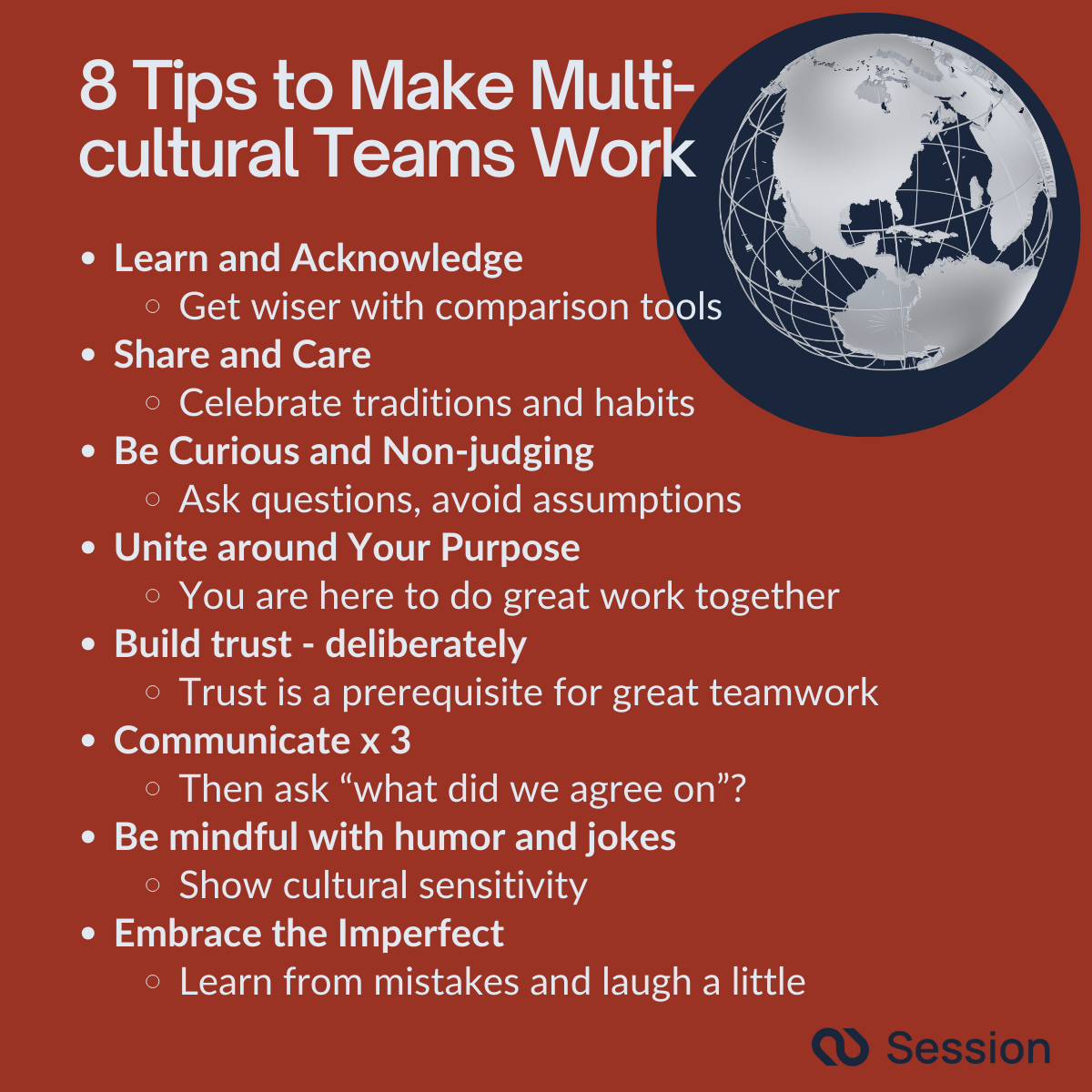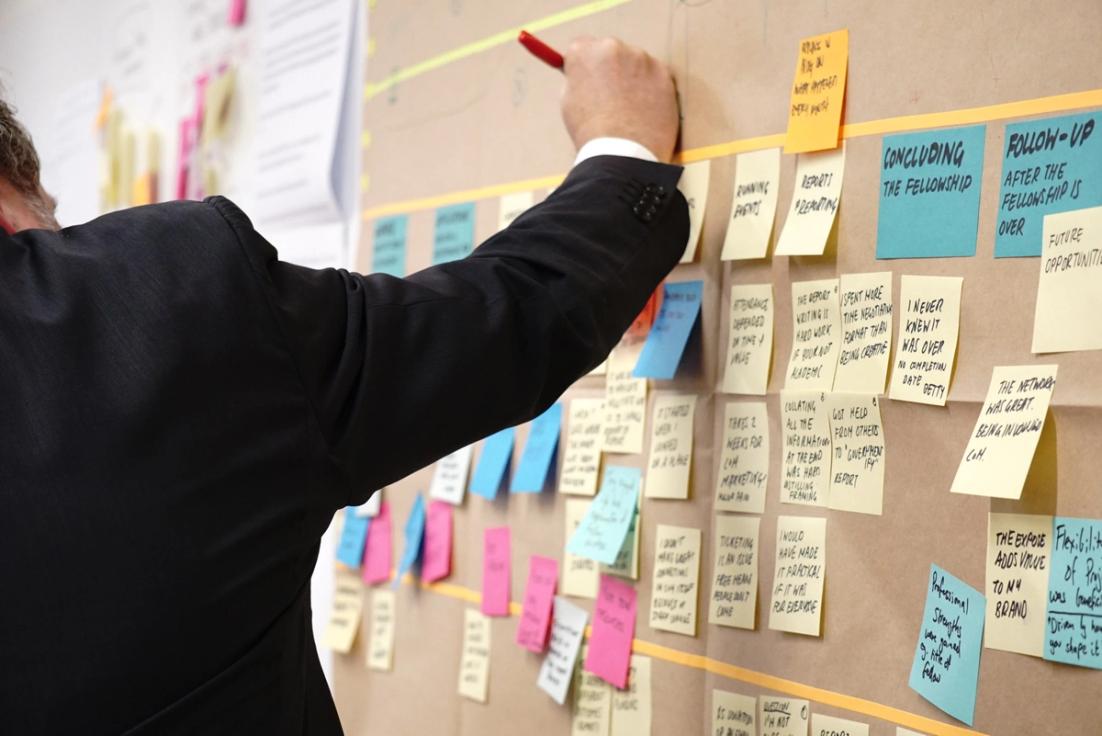Are you (also) working in or with a multicultural team? Then - lucky you. Research shows that companies in the top quartile for ethnic and cultural diversity outperform those in the fourth quartile by 36% in profitability! Well, that’s something! And since most of us experience working in multicultural teams these days, we better learn how to make it work!
Working in a multicultural team can be fun, challenging, hard, easy - all at the same time. It all depends on how much effort you deliberately have put into building the team into a real-life high performing team - which we all know takes some time and energy. It doesn’t happen by itself overnight.
When it comes to multicultural teams, the effort you need to put into making the team work might be higher than if the team is very heterogeneous. This is due to the fact that the likelihood of conflicts and misunderstandings is much higher when people come from different cultural backgrounds and upbringings, including different ways of being schooled and with different expectations to what good teamwork and leadership looks and feels like.
Follow the tips below to build a great multicultural team, and ripe the fruits of innovation, better performance, and more fun and engagement at work.

8 Tips to Make Multi-Cultural Teams Work
- Learn and Acknowledge. A great way to get to understand where the team-mates are “coming from” and what characterizes their country of origin, is to dig into the different culture maps that’s available, like Erin Meyes “Country Mapping Tools” or Hofstedte’s “Country Comparison Tools”. These tools give insight into how different countries score on for instance hierarchy, emotional expression, confrontation and feedback-style. The insights may give you many “aha” moments - but be aware that individual differences within a certain culture may differ as much as between cultures (personalities matter), so avoid over-generalisations or jumping to conclusions!
- Share and Care: Celebrate cultural traditions and let teammates talk about their cultural backgrounds, including local traditions, what food they like, what holidays they celebrate, what they do on birthdays, where they travel to for vacation etc. Some call it cultural spotlight moments. Find your own word for it, the important thing is to heighten the understanding, awareness and appreciation of the intercultural differences on the team and to let everyone explain themselves on their own terms.
- Be Curious and Non-judging - When someone from your team does something you find weird, irrational, or outright rude - ask them what is going on. Tell them how what they just did “made you wonder” because this is not behavior you would have expected (or maybe even wanted). Try to avoid making generalizations based on a few instances - stay open, ask “I wonder why…” questions and invite for an open dialogue.
- Unite around Your Purpose. Team-members on multicultural teams can benefit from their different backgrounds, experiences and ways of solving a task. Remind each other of your common goals, tasks and purpose. What are we here for? What problems are we trying to solve? Then, find the best way to work together towards the shared vision. Establish clear role-descriptions, responsibilities, workflow processes, feedback mechanisms, ways of communicating etc!
- Build trust - deliberately. Building great, high-performing teams requires trust and psychological safety. Team-building works!
- Communicate Communicate Communicate. One of the most often seen mishaps of multicultural teams is misunderstandings due to poor, not enough or complete lack of communication. You often hear how important it is to repeat a message, if you want people to remember it. This also counts when it comes to intercultural team-work - and perhaps even more so. Train your listening skills, ability to ask questions and stay open-minded rather than just judging and answering. Over-communicate, repeat, explain thoroughly why you do, what you do and what you would like for others to do. Spell it out. And then ask: Is this clear? What did you just hear? What did we agree on? And make your colleague repeat it, even though this might seem awkward and a little unnecessary.
- Be mindful with humor and jokes… It is not just between generations that misunderstandings occur - you might not be as funny as you think!
- Embrace the Imperfect - When working in a multicultural setting, misunderstanding will happen, people will misread you, you will misread them and you will make mistakes, you might not even be aware of until later! So - you need to learn to forgive yourself and others. The rule about making it safe to make mistakes (and learn from them) also counts here. Vulnerability, openness and a good laugh is the way forward. If you want to go far, go together, even if the road is bumpy and full of twisted ways.
Conclusion
In conclusion, the success of multicultural teams hinges on understanding, respecting, and leveraging the diverse backgrounds of each member. By embracing cultural differences and fostering an environment of open communication and mutual respect, teams can unlock their full potential. The tips provided in this guide are not just steps but a journey towards creating a more inclusive, innovative, and productive workplace. Remember, the strength of a multicultural team lies in its diversity - each culture, perspective, and experience adds value, leading to richer ideas and more robust solutions. So, embrace these differences, celebrate them, and watch as your team grows not just in numbers, but in wisdom, creativity, and efficiency.
If you would like to know more about this topic - then check out the article “Intercultural Awareness at Work and in Leadership” by Susan Shirley.













